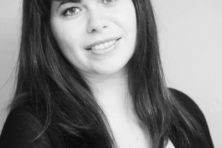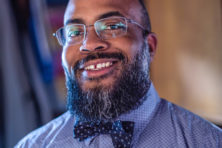Questions & Authors: Edward McPherson Explores Passions Through Writing
- Share
- Tweet
- Pin
- Share

For Edward McPherson, history and recollection play a large part in his writing. His most recent work, The History of the Future: American Essays, explores how understanding our past can help us understand where we might be heading.
One of his essays that was published in the Gettysburg Review, “Telref,” received a Pushcart Prize. He is also the recipient of the PEN Southwest Book Award, and received a Guggenheim Fellowship this year. McPherson is joining the Hal Prize, the Peninsula Pulse’s annual creative-writing and photography contest, this year as a nonfiction judge. McPherson and I chatted about how he got into writing, his three books and what he is working on as a newly minted Guggenheim Fellow.
The following is an excerpt from a Door County Pulse Podcast that has been edited and condensed for clarity. Listen to the full podcast below.

Grace Johnson (GJ): What led you to a creative writing career? Is that something you have envisioned from a young age?
Edward McPherson (EM): If you caught me in fifth grade, I would have told you I wanted to be some kind of scientist, like a chemist. I was always carrying around a box of machine parts that I was convinced I would turn into a robot or airplane. But I was always a voracious reader.
I had one of those life-changing teachers in 7th grade. That really opened up English classes to me and there was no looking back. In college, I didn’t know what I wanted to do. Then in senior year, I had my first creative writing class and it blew my mind.
GJ: Two of your books focus on some niche topics. One is about Buster Keaton, and the other about bridge [the card game]. How did you land on those topics?
EM: I was working at a magazine and living in New York. But the magazine was sold and I was in the process of losing my job. I mentioned to an older friend that I was obsessively watching old Buster Keaton movies. I thought they were so modern and unexpected. He knew through the grapevine that a British publisher was looking for a Buster Keaton biography. So with all of the daring of a 20-something I said, “Oh, I’ll do that.” I wrote a book proposal and just got dumb luck – they liked it, and that was my first book.
Further dumb luck: I wrote that book in a run-down residential hotel and on the top floor of that there was a bridge club. While I was writing, I was seeing all of these eccentric people and wanted to know who they were.
GJ: You received the Guggenheim Fellowship back in April. What were the results of this fellowship and what project are you going to be working on?
EM: It was a tremendous and welcome surprise. Most writers I know aren’t in it for the money, but want money to convert it to time. This allows me to spend the next year working on my new book – full stop. Already this summer, I have done more work on the book than I have in the last three years.
This book is focused on the idea of the longview or the big picture, both very literal and metaphorical. The literal is this geo-spacial intelligence happening in St. Louis where I live. It is a fancy term for using satellite pictures to make decisions on the ground.
GJ: What are you looking for in Hal Prize submissions?
EM: One of the things I love about nonfiction is it’s such a baggy genre. I love everything about it. Nonfiction is constantly expanding and redesigning itself.
What I’m drawn to is the sense that the writer has some control over what they are doing. They have an instrument and they know how to play it.
Submissions in fiction, nonfiction, poetry and photography are open for the 2023 Hal Prize through Sept. 1. Learn more and submit at thehalprize.com/submit.
Winning and honorable-mention submissions to the Hal Prize are published in 8142 Review. Copies of Vol. 1 and 2 – which feature the work of the 2021 and 2022 winners, respectively – are available for purchase at doorcountypulse.com/shop.




